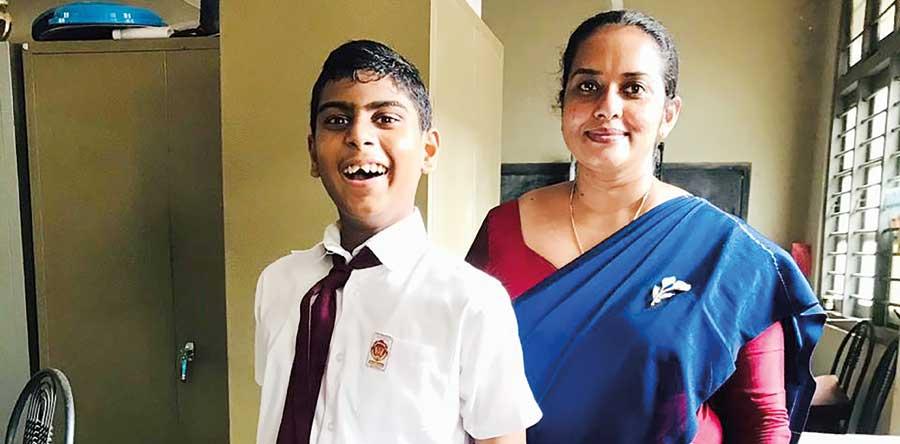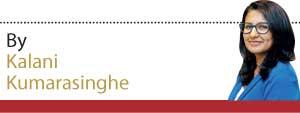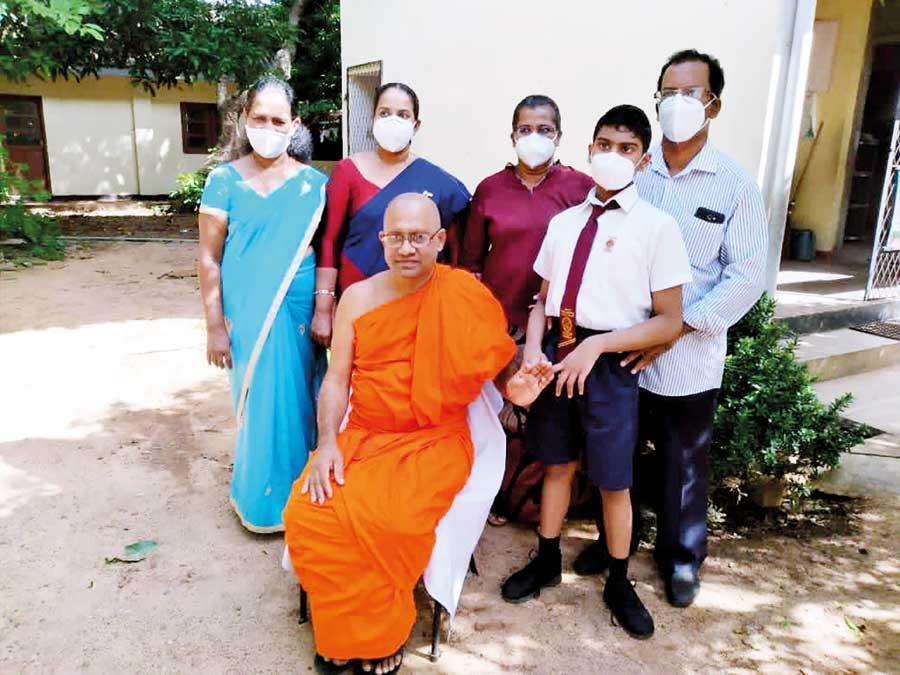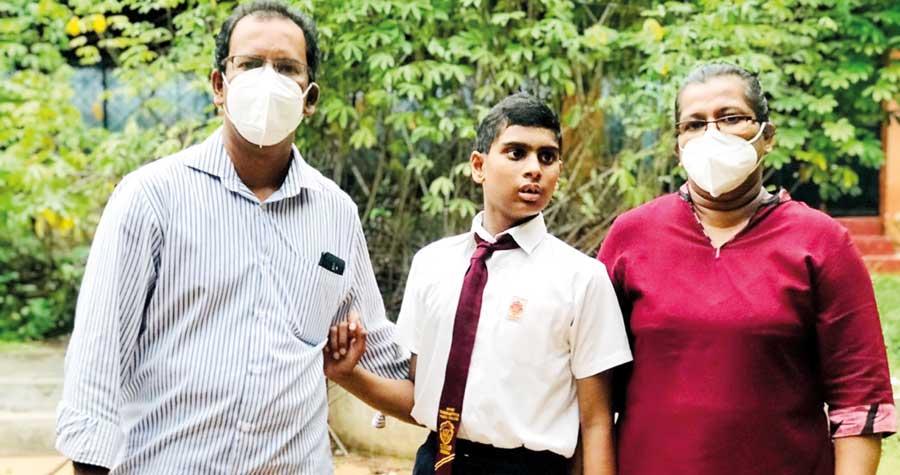20 Nov 2020 - {{hitsCtrl.values.hits}}
Examinations can be a stressful time for both the students and parents and even more so for parents of children with special needs. One inspiring family shows that with enough love and attention, every child, no matter what their limitations are, can have the education they deserve.

- This dedicated teacher travels 80 kilometres from home every morning at five a.m. to reach Vijaya Vidyalaya in Karagampitiya. She also suffers with an illness that does not allow her to stand for a long period of time
- He is unable to speak and write, according to his father. Despite these limitations, however, Ramal obtained 99 marks in the recently held scholarship examinations
- opportunities and accommodations were not readily available to Ramal. His mother believed that Ramal could one day sit for competitive examinations. She was also a keen believer that Ramal could benefit from the classroom environment. This is when Ramal’s mother walked from one school to another, explaining the needs of her child, only to face rejection after rejection
Ramal Christopher Sahabandu is a child with Cerebral Palsy, in other words, Ramal is a child with limitations and special needs. He is unable to speak and write, according to his father. Despite these  limitations, however, Ramal obtained 99 marks in the recently held scholarship examinations, renewing hopes of many parents whose children experience limitations, similar to Ramal.
limitations, however, Ramal obtained 99 marks in the recently held scholarship examinations, renewing hopes of many parents whose children experience limitations, similar to Ramal.
Cerebral Palsy (CP) is not a single disease but a group of neurological disorders that show up in infancy or childhood. This permanently affects muscle movements and posture, leaving a child with CP limited for life. The condition may present various symptoms including vision, speech or learning problems, and in some intellectual disability, epilepsy and partial or complete loss of voluntary muscle movement. 
But Ramal displayed no intellectual limitations, and his parents were committed to allowing Ramal to learn, something which Ramal enjoyed, according to his father.
“At first there was no way that Ramal could sit for a competitive exam,” he recalled. “We were keen to have Ramal sit for the exam as we realized that he is capable and excited to learn. But the Examination Department had no experience with a child-like Ramal,” he said.
At a special Grade 5 scholarship examination meeting, held for parents of children with special needs, Ramal’s parents discovered that examinations were not prepared to handle or assess their child.
“There were several categories under which every child could apply for. But when we described Ramal’s limitations, they first said that there was no way that the Examinations Department could assess Ramal. You see, speech can be recorded, written answers can be reviewed. But my son was limited in both,” the father said.
“In foreign countries, there is a system called scribing. That’s where someone transcribes the answers for a student in an examination. It was something challenging for us. But my son has been educated and prepared for the exam in this way,” he added.
"In foreign countries, there is a system called scribing. That’s where someone transcribes the answers for a student in an examination. It was something challenging for us. But my son has been educated and prepared for the exam in this way, he added"
Ramal had to quit the writing portion of the examination, as he is unable to write. Due to a sensory integration disorder, he is also limited in typing. But he is now capable of Ramal using a Bluetooth keyboard specially designed for children with limitations, along with a tablet. “I’m not financially well-off, we had to wait till people supported us with a tablet,” Ramal’s father said.
“Since Ramal only received the keyboard and tab recently, there was not enough time for us to prepare him for an exam in this way. Hence, my wife had built a system of cards with numbers, to indicate a correct answer for a question, especially in arithmetic.”

Ramal with his principal Venerable Bandara Kumbukwewe Shanthideva
With the dedication and support of his mother, Ramal continued to learn. However, this family was not alone in their journey. Samanmalie Sumanasena, Professor in Paediatric Disabilities at Faculty of Medicine, University of Kelaniya and the Ayati Centre has been the guiding light, in encouraging Ramal’s education.
It was not just an individual effort, there were so many people, who contributed to the achievement of my son, the father stressed. “We met the Commissioner General of Examinations Mr. Sanath Pujitha, who navigated us to a System Commissioner, after our appeal. We knew that our son was brilliant. We just wanted an opportunity for them to see this too. We asked the officers to give Ramal a paper, which he could answer through a scribe. And they agreed.” Christopher recalled that although the Examinations Department had no prior experience with a request like theirs, the officers obliged to help and give Ramal an opportunity.
Small school, big heart
But opportunities and accommodations were not readily available to Ramal. His mother believed that Ramal could one day sit for competitive examinations. She was also a keen believer that Ramal could benefit from the classroom environment. This is when Ramal’s mother walked from one school to another, explaining the needs of her child, only to face rejection after rejection.
“When we enrolled Ramal at this school, the Buddhist monk who is in charge of the school said that the work we have done for our son was far greater and that they were only happy to accept Ramal,” the parents said.
“Although Ramal should have joined the Grade 5 class, we decided to enrol him first to the Grade 3 class,” Venerable Bandara Kumbukwewe Shanthideva, the Principal of Vijaya Vidyalaya said. Ramal was admitted on the condition that his mother would be beside him in the classroom, as the school was not equipped to handle special needs of students.
"Even the teachers of our school were against me for admitting this child. So, I asked the teachers who opposed me, to simply leave the school if they cannot accommodate this child. After all, what good are the teachers if they don’t have compassion"
“Even the teachers of our school were against me for admitting this child,” Venerable Shanthideva recalled. “But this was a school that was on the verge of closure, I campaigned with personal funds for children to be sent to this school. So, I asked the teachers who opposed me, to simply leave the school if they cannot accommodate this child. After all, what good are the teachers if they don’t have compassion,” Venerable Shanthideva questioned.
Ven. Shanthideva admires the commitment of Ramal’s parents. “Not only is this child blessed with love and care, but his parents are also amazingly dedicated. There have been times where there were not enough teachers in the school, and I entrusted Ramal’s mother to take care of the children in a class. She undertook that task and took care of all the children as if they were her own. Ramal’s father has found donors for the school to get fans installed for the children when the buildings were too hot to stay inside. They contribute to maintaining this school like their own,” Venerable Shanthideva said.
“My wife’s intention was for Ramal to be with normal children, not to even do studies, but for him to just to absorb that environment of being in a school with other children. We felt that it was important. Because Ramal only sees people in wheelchairs and have various other limitations, we didn’t want him to feel that he was not alright. We wanted for him to feel like a normal child would,” the father explained their decision to enroll Ramal in school.
Ramal’s parents soon discovered that the other children at the school were so supportive and that the environment was really helping him. Ramal loved his classroom. He started studies, he was keen and was soon able to express his answers, according to his parents.
Ramal is one of my six children
Mrs. Arandara, a graduate of the Jayawardenapura University’s Management Faculty, specialising in Accountancy, worked in the private sector for over a decade. Owing to personal reasons, she decided to bid adieu to her accountancy career and decided to work as a teacher.
Mrs. Arandara received her first appointment on January 7, 2019 to Vijaya Vidyalaya. Following a month-long training programme, she was appointed as the class teacher for Ramal’s class. She was experienced in Accountancy, not special-needs education. But the Principal, Venerable Shanthideva decided that Mrs. Arandara would be a perfect fit for Ramal’s class.

Ramal with his parents
Mrs. Arandara drew on her instincts to teach not only Ramal, but also the other four students in the class. “I’m a mother myself, my daughter is of the same age as the children who are entrusted to me. I treat them as I treat my own children, and Ramal is just one of my six children,” Mrs. Arandara said, when asked about the challenges of taking up a new career.
With his mother by his side, Ramal blossomed in school. He loved his friends, the new environment fit him well and was always eager to learn. When it was time for Ramal to graduate to the next year, the Principal decided that the class teacher should not be changed. Therefore, Mrs. Arandara was requested to take charge of the same class in the fifth grade.
"My wife’s intention was for Ramal to be with normal children, not to even do studies, We felt that it was important. Because Ramal only sees people in wheelchairs and have various other limitations, we didn’t want him to feel that he was not alright. We wanted for him to feel like a normal child"
“Ramal’s mother is extraordinary. She spent both years with Ramal, in the classroom. And it was her dedication, commitment and sacrifice that resulted in this boy’s success. I like to believe that our interests aligned and my work as the teacher only complemented his mother’s efforts,” the teacher humbly said.
Asked about Ramal’s activity in the classroom, the teacher said that he was an eager, bright and kind child. “If I go to the classroom in the morning and asked the students, who liked to sing a song, it would be Ramal who puts up his hands first,” Mrs. Arandara recalled.
“Ramal cannot speak or sing. But he would step forward, express in his way, through gestures, a song that is in his mind. Then the mother and I would recognise the song and we sing it together. That makes Ramal so happy. He loves it,” she said.
Ramal is also a kind friend and loves his peers as well as teachers. “He’s really extraordinary and goes on to show how much we have to give to these children,” the teacher said. “I had never shown or thought that Ramal required special needs. I have taught him and other children the same syllabus, in the way I would do with any other class. But Ramal grasped it quickly. Out of the five, one child displayed constant hyperactivity. I had to teach the same thing to this child at least a dozen times. But this was never the case with Ramal, he grasped things instantly,” she said.
Among Ramal’s peers was also a child who couldn’t write even though the child was admitted to fourth grade. Mrs. Arandara started with basic literacy for this child and managed to have the child sit for the scholarship examination. “The child obtained 70 marks, for me that’s an achievement. All these children have progressed well and I value all of their achievements,” she said.
This dedicated teacher travels 80 kilometres from home every morning at five a.m. to reach Vijaya Vidyalaya in Karagampitiya. She also suffers with an illness that does not allow her to stand for a long period of time. Nevertheless, she insists, that this small school, deserves her love and attention.
27 Nov 2024 21 minute ago
27 Nov 2024 51 minute ago
27 Nov 2024 1 hours ago
27 Nov 2024 2 hours ago
27 Nov 2024 3 hours ago